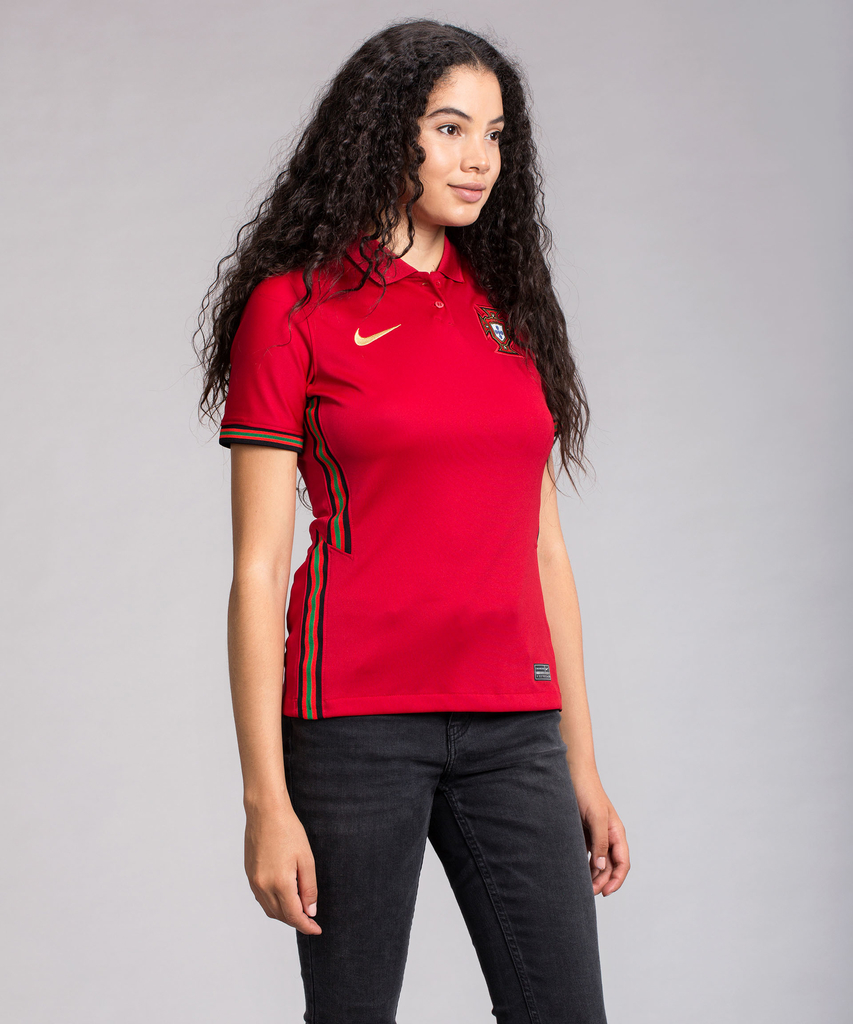- Official Site
- Portugal+
- Ticket Office
- Results
- Channel 11

Learn all about Women's Football in Portugal
Women's soccer is on the rise year after year! With the help of Portugal Store, you can discover all the details and history of this sport today!
9 May 2022
Soccer when it was born was not for everyone. For many decades, soccer was seen as a strictly male sport leaving no room for women to express their arguments on the field of play.
All that has been gradually changing, and the best expression of that change are the figures for the latest women's soccer world cup to be held in France in 2019. According to FIFA, 1.12 billion people followed this women's World Cup on TV or through digital platforms, while the average audience per game more than doubled compared to the 2015 World Cup in Canada. At the time, each game of that World Cup had been watched by some 8.39 million. In France, there were 17.27 million viewers per game.
Origin of Women's Soccer
Despite the recent growth of women's soccer worldwide, as we mentioned in the introduction to this article, it is not easy, given the ostracism to which they were ostracized for a long time, to find records of women in soccer.
Outside what is considered the "homeland of soccer," the first records of women in soccer in countries like France and Russia only appear, respectively, in 1910 and 1911, while in Italy and Germany they only occurred after World War I.
In Brazil, the first available evidence of a women's soccer match dates back to 1921 and concerns a game between a team from the state of Santa Catarina and another from the state of São Paulo.
World, European and UEFA Womens Champions League
Over the following years, other countries, including Portugal, followed in the footsteps of these pioneers, but it took until 1971 for the first prototype of a women's World Cup to become a reality. This "Mundialito" format tournament held in Mexico under the auspices of the Federation of Independent European Female Football (FIEFF) brought together six teams (Mexico, Argentina, France, Italy, Denmark and England) and ended with a 3-0 victory for Denmark over Mexico.
This type of "mundialito" and occasional international tournaments were the best the soccer world offered to women's national teams during the 1970s and 1980s. It was in 1991, after years of pressure on FIFA to truly invest in women's soccer, that the wishes of thousands of players around the world had an effect with the organization of the first FIFA Women's World Cup. This tournament took place in China and ended with the North American team beating its Norwegian counterpart 2-1.
If the World Cups only started in 1991 and didn't count, until then, with the presence of the Portuguese women's national team, the European championships not only have a slightly older history, but have also seen the Portuguese "das Quinas" team among the finalists of the competition.
Born in 1984, the European Women's Football Championships have already 12 editions, including the 2017 edition in the Netherlands, which marked the debut of the women's national team equipment in major international competitions.
The growth of women's soccer in Europe is also occurring on the club level. Along with the birth of professional women's leagues in countries such as Sweden, Germany, Spain, France and England and the development of championships such as the Portuguese one, the UEFA Womens Champions League was created in 2009 to replace the old UEFA Womens Cup.

History of Women's Soccer in Portugal
It is difficult to trace the origin of women's soccer in Portugal, since there are few records of female participation in the sport. However, there is news regarding games held in March 1935, between female teams from Paços de Brandão and C.D. Feirense. Between 1935 and 1936 several games were held, however, there are no records of such confrontations inside the four lines.
In 1985, the Portuguese Football Federation created the "mother" of the national competitions for women's soccer clubs. Called the Women's National Soccer Cup, this competition was played in a similar way to the extinct Portuguese Championship (men's) and was responsible for determining the national champion until the 1992/93 season.
With eight consecutive titles, the Boavista women's team was the great dominator of this National Cup and the first editions of the National Championship that followed, having won three of the first four truly national women's championships played in Portugal.
After the domination of Boavista and the interlude of Gatões Futebol Clube, the 2000s saw União 1º Dezembro take over women's national soccer and win 12 national championship titles until 2012, eleven of them consecutive. In the following four years, the women's national soccer championship was won in double figures by Atlético Ouriense and Futebol Benfica, respectively, a period that preceded the entry on the scene of Sporting, Braga and Benfica that would eventually lead to a greater professionalization of the competition and media coverage by the media (matches are currently broadcast on channel 11), companies (the Portuguese league started having an official sponsor) and the general public.
It is between these three Portuguese soccer greats that are disputed not only the last four national titles, but also the respective editions of the Portuguese Cup. A word for this last competition which began in the 2003-2004 season with a 6-0 win for 1º Dezembro over Sport Marítimo Murtoense. With the exception of the 2019-2020 season, all finals of the women's Portuguese Cup are, similarly to what happens in men's soccer, in the National Stadium.
One note, the women's soccer match with the highest attendance in Portugal was 15,204 people in the solidarity derby between Benfica and Sporting played at the Restelo Stadium in March 2019.
Women's National Soccer Team: a story of resilience
Although still far from the fame and success of its male counterpart, the women's national team is taking solid steps in its growth.
The first game played by a women's national team took place in 1981 against France and ended in a zero score draw. Three years later, the Portuguese team entered the qualification process for the first ever European Women's Championship, which ended with two draws and four defeats. The following four Europeans would also not count with the presence of the "das Quinas" team, but this time due to not even qualifying. This would only become recurrent after the qualification for Euro 95 and culminated with Portugal's spectacular qualification for Euro 2017 held in the Netherlands.
This historic achievement not only for the Portuguese women's team, but also and above all for all Portuguese women, athletes or not, started with a 2-0 defeat against Spain followed by a fantastic 2-1 win against Scotland. The hopes of taking the dream further ended at the hands of England, one of the best teams in the world, on the last day of the group stage with a narrow 2-1 defeat.
However, and to the pride of all Portuguese people, the A team in women's soccer, will compete in the Women's European Championship that starts on July 6, 2022. With Russia's withdrawal from all international team competitions, Portugal managed to get its place in Group C (where it will face three great teams: Switzerland, Sweden and the Netherlands) and is ready to show the world the value of the Portuguese women's soccer team!
In World Cups the story is not the same. Present in all the qualification phases for the women's world cups, the best the national team managed was two third places in the respective qualification groups for the 2011 and 2019 World Cups. Proof of the Portuguese women's national team's evolution is the current second place it occupies in the qualifying stage for the Australia/New Zealand 2023 World Cup in a group with Germany, Serbia, Turkey, Israel and Bulgaria.
A word in this brief history of the national women's soccer team for the prestigious Algarve Cup, a competition that brings together in the Algarve, annually since 1994, the best world teams of women's soccer. In this particular, it is worth highlighting the fantastic performance of the national women's team in the 2018 edition where, after beating China, Norway and Australia, they ended up winning the bronze medal.
In individual terms, the women's national team's all-time top scorer is Edite Fernandes with 39 goals, while the 145 times she wore the "Quinas" jersey ensured Carla Couto the first place among the most international players ever.
Confirming the good moment of women's soccer in Portugal, the Portuguese women's national team recently rose to the 25th place in FIFA's ranking, the best position in its history.
Will the ranking go up with this European Championship? We will all be watching and rooting for our team to be the winner!

- Choose a Language
- Portuguese
- English

